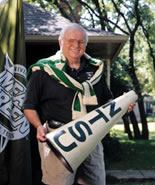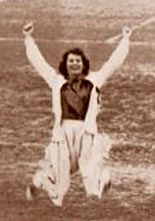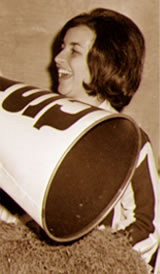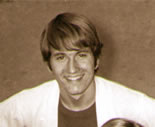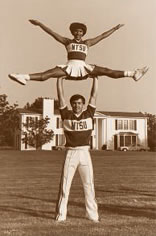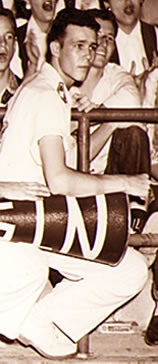 |
|||||||||||||||||

|
Cheering on the Green and White |
Cheerleader Shannon O'Toole dodged tortillas thrown by spectators at her first home football game in 1995. Wade Hampton ('62) received the wrath of Dean Imogene Bentley when he hid a bottle of bourbon in his megaphone.
And
Paula Nichols Cogdell ('83) had her "all-time funniest and
embarrassing moment" during a nationally televised basketball
game in the Coliseum. "The
girl whose legs I held onto broke the cardinal rule — she
put lotion on prior to the game," she says. Shouting vs. stunts Cheerleading first started at North Texas in the 1920s. Until the 1980s, it emphasized yelling and jumping rather than pyramids, partner stunts and throws, and tumbling routines — the emphasis of cheerleading today.
"I
had zero gymnastic skills. If I was in college today and tried out,
there's no way I would be chosen," says Pat Noah Graham ('53). Cheerleaders
from the 1950s, '60s and '70s were limited to holding pep rallies
and cheering
at home football and basketball
games. They traveled to away games only on special trips sponsored
by the North Texas student government association — or when
they could raise the money to go. Campaigning for cheerleader
While
a committee selects North Texas cheerleaders today,
the student body elected the cheerleaders from the 1950s until
the early 1970s.
"My fraternity brother Jim Hobdy ('69) was my campaign manager," he says. "I went to every dorm, lunch table and sorority, passing out buttons. I figured the guys wouldn't vote, so I tried to get the girls' vote." In 1972,
cheerleader selections by the student body were
discontinued after a controversial election, Pfieffer says. Pfieffer left the cheerleading squad in 1973 to be on the Student Senate. As a member of the Rules and Elections Committee, he successfully lobbied to have a selection committee choose the cheerleaders. Recognition for athletics After college cheerleading nationwide became more athletic in the 1980s, squads started competing for stunt awards at National Cheerleading Association summer camps.
North Texas students trying out for cheerleader were required to have skills in gymnastics and tumbling. "You
had to do a back handspring to make the squad," says Sharon
Nash ('82). North Texas won its first NCA National Collegiate Championship in 1995, a few years after the annual championship began. Two more championships followed in 2000 and 2002. The benefits of cheerleading Several
alumni from the 1980s and '90s made cheerleading a career
after leaving North Texas.
"Cheerleading has taken a lot of hits with the idea that cheerleaders are airheads," she says. "But we do as much training as any other athletic program." O'Toole,
who cheered at UNT from 1995
to 1997 and placed third in the NCA championships partner stunt
competition in 1995, is now on the NCA instructional staff. Alumni who didn't make cheerleading a career say their years in front of crowds also benefited them. "The
socialization skills from cheerleading are fantastic. You learn to
be your best self because you're representing
the university,
and that's something you use your whole life," Munday
says.
|
||||||||||||||||||||||||||||||||||||||||||||||||||||||||||
